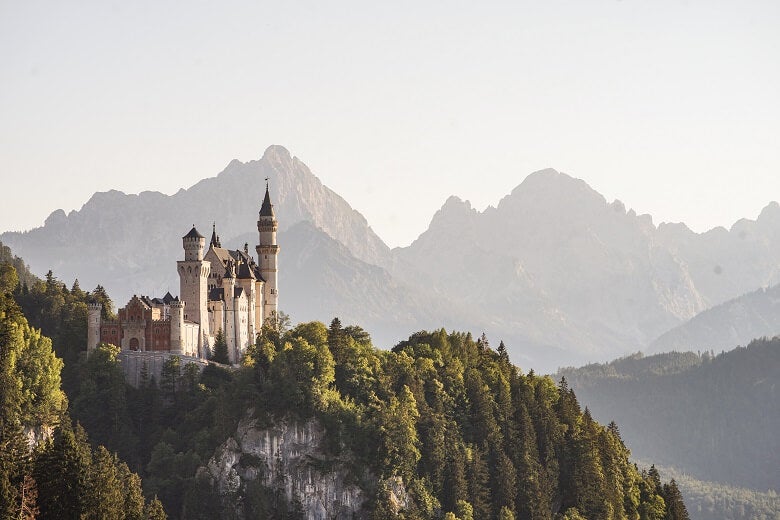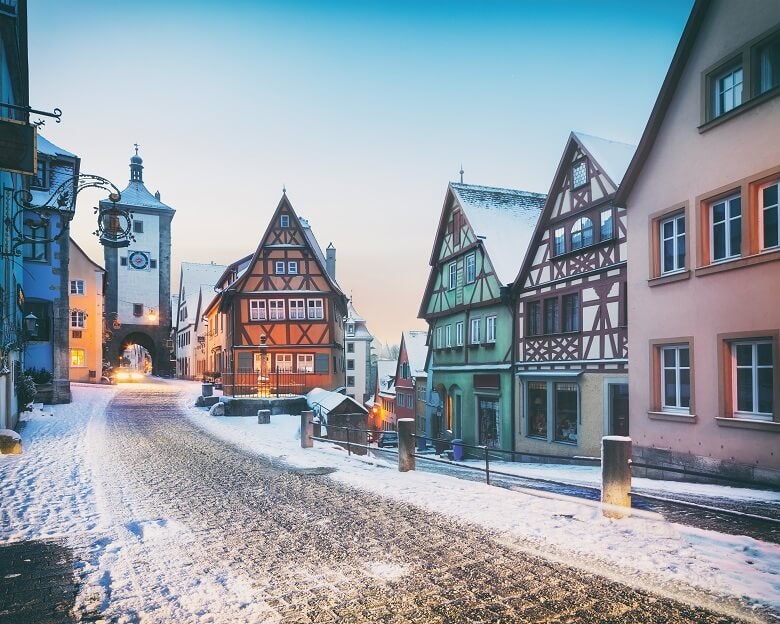21 Things to Know Before Moving to Germany
Thinking of moving to Germany? With rich culture, hearty cuisine, and surprises lying around every corner, you’re bound to have an excellent time.
Of course, for some people, there may be a little bit of culture shock. But fear not – we’re here to give you a heads-up on all the things you need to know before moving to Deutschland.

Neuschwanstein, one of Germany’s 2,000 castles, was used as a model for Sleeping Beauty’s castle
1. Learning the language goes a long way
Although many Germans speak English, locals will appreciate expats who make an effort to speak a little German here and there. Plus, in more rural areas, most of the signage you’ll come across is written in German only.
Start off by learning the basics:
- Hallo – Hello
- Tschüss – Bye
- Bitte – Please
- Danke – Thank You
- Ja – Yes
- Nein – No
- Entschuldigen sie mich – Excuse me
2. Explore some of the most bike-friendly cities
Germans are avid cyclists – and it shows. Many city infrastructures are built with cycling in mind, which means there are bike lanes basically everywhere.
German cities Bremen and Berlin both feature the Copenhagenize 2019 index of most bike-friendly cities, with Bremen claiming the 11th spot in a worldwide comparison.
3. The healthcare system is great
The German government offers free healthcare to all its citizens – including expats (as long as you have some sort of health insurance). Roughly 87% of people in Germany use public health insurance (Gesetzliche Krankenversicherung), which allows citizens to join one of 109 insurers, known as sickness funds.
Germany’s universal public healthcare system is funded through taxation, and covers almost all medical treatments. Better still, any statutory copayments you might need to pay for prescriptions are usually very cheap.
4. Germans are big on recycling
Germany’s ‘Green Dot’ recycling scheme charges manufacturers higher fees for excess packaging, as well as encouraging citizens to recycle everything.
Glass bottles are separated by colour, organic waste gets sent to compost, paper and cardboard are recycled, and electronics are organised to see if they can be reused. Everything has its place.
5. Christmas is magical
Explore Christmas markets with delicious food and beverages at every turn, ski down snowy mountains, ice skate over frozen lakes, or simply gaze at snow-dusted castles.
Whether you’re after a child-friendly experience or a wild weekend on the run-up to Christmas, there’s something for everyone.
6. You might get a taste for techno
Germany’s techno music scene is unmatched – and Berlin is the epicentre.
After the fall of the Berlin Wall, many abandoned buildings became home to various illegal parties – the perfect breeding ground for the city’s love of techno music. Nowadays, most small clubs tend to have at least one dedicated techno night each week, but the big clubs are where you’ll be treated to more of an extravagant show.
7. Always stick to the rules
If you want to get along with everyone you meet in Germany, play by the rules.
For starters, jaywalking is a big no-no. If you’re seen walking across the road without using a proper crossing, you’ll most likely be greeted with disapproving stares. You’ll also want to steer clear of the cycle paths whilst walking – unless you want to get an angry earful from cyclists passing by.
Above all, never – ever – disrespect quiet hours. These hours are regulated by law, which effectively means no loud noise on Sundays. Even putting loud music on, vacuuming, or putting a load of washing on during quiet hours can lead to a visit from the public order officers.
8. The cost of living is reasonable
According to the Expat Insider Survey, the average cost of living in Germany is also pretty average compared to other countries around the world.
Although prices are going up gradually, Germany is still one of the more affordable European countries to live in. Of course, this will depend on where you plan on moving to – Munich, Frankfurt, and Cologne are Germany’s most expensive cities.
On average, a household’s living expenses in Germany is usually €850 (£738) per month – with 36% of this going towards housing and utilities.
9. There’s no such thing as ‘fashionably late’
Whether it’s for a social event with friends or a business meeting, you should avoid being late in Germany at all costs. As part of the country’s culture, Germans are extremely punctual, and even a few minutes’ delay can offend people.
It’s normal for colleagues to arrive around 5-10 minutes early for meetings, so the event can start right away.
10. Sunday is the day of rest
Expect most parts of Germany to look like a ghost town on Sundays, as most shops – save for petrol stations, train stations or airports, and restaurants – will be closed.
This is due to the Ladenschlussgesetz (store-closing law), which forbids shops from operating on Sundays. Although this partly takes religion into account, as a day to honour God, it’s also an opportunity to give workers a break each week.
11. ‘Cash is king’
As one of the most innovative, tech-savvy countries in the world, it might come as a surprise to know that many German cafes and small businesses only accept cash.
Although online and mobile payment systems have edged their way into payment systems in recent years, for many German businesses owners and consumers, ‘cash is king’ is still a motto to stick by.
12. There’s an excellent work-life balance
As an employee, you’ll be valued quite a lot in Germany.
The OECD’s Better Life Index ranks Germany 8th out of 38 countries for work-life balance, which is all the more impressive when compared to the UK in position 28. According to the Index, only 4.26% of German employees work ‘very long’ hours – much lower than the 12.7% of UK employees that report the same.

Half-timbered houses and cobblestone lanes in Rothenburg ob der Tauber, Germany
13. When it comes to holidays, you’re spoiled for choice
Let’s not beat around the bush – Germany is stunning. Whether it’s the Bavarian Alps, the Black Forest, or the Moselle valley, you’ve got tonnes of natural wonders to see. Plus, with some of the world’s most exciting cities on your doorstep, you’ll also have a number of city break options on hand.
Hoping to explore more of Europe? Luckily for you, Germany is bordered by nine different countries – that’s a lot of holidays to plan.
14. You can get around easily
If you don’t have a car, don’t worry – Germany’s fast and efficient transport can get you around. Options include:
- S-Bahn (Schnellbahn or Stadtschnellbahn) – The fastest form of public transport
- U-Bahn (Untergrundbahn) – The German version of the metro
- Bus – Usually links more isolated towns and often operates into the night
- Regional trains – These are either Regionalbahn (RB), which have multiple stops, or Regionalexpress (RE), which are faster and have fewer stops
If you do have a car, you might want to brush up on the rules before hitting the roads – especially regarding the German Autobahn. On this highway, motorists are only allowed to stop for emergencies, and having an empty tank apparently doesn’t count – in fact, it’s actually illegal to run out of fuel on the Autobahn.
15. Germany has a great education system
Out of 40 countries, Germany scored the 8th best when it came to the average student’s literacy, maths, and sciences results. Earning a score of 508, Germany is far beyond the OECD average of 486.
Higher education in Germany is also superb. Funded mainly by the state, students here get to pick from around 400 institutions – the majority of which are free of charge. International graduates can also benefit from this free schooling, with a chance to stay for an additional 18 months to seek work once their course is over.
16. Beer is taken very seriously
Beer plays a major role in German culture, and has done for years.
The first beer laws in Germany were passed over 500 years ago. Known as the Reinheitsgebot, these laws apply to most parts of the country, and specify what can and can’t go into good quality beers. As a result, Germany has one of the most sophisticated and diverse brewing industries in the world.
So, if you’re a beer fanatic, prepare your tastebuds for some of the world’s tastiest tipples.
17. Children tend to be more independent
Youngsters practically roam free in Germany. As soon as children turn six years old, they’re usually allowed to ride the train or bus, walk to school, or pop to the shops – all without an adult accompanying them.
If you’re struggling with childcare, you’ll also be pleased to know you’ll be able to leave your child at home alone for up to six hours from the age of 10. And if you really trust them, at age 11, they can begin babysitting close friends or family members for up to two hours.
18. There are a lot of castles
Over 2,000, to be specific. And we’re not just talking about old, half-fallen-down ruins – Germany’s castles are iconic. Neuschwanstein, for example, is so impressive that Walt Disney used it as his model for Sleeping Beauty’s castle.
There’s also Burg Eltz, which is tucked away in a green valley and hailed as one of the greatest fairytale castles in the world. And if you want to visit real-life royalty, head on over to Hohenzollern Castle, where the Prince of Prussia and his wife still live.
19. There are festivals galore
Who doesn’t love a city-wide get-together to enjoy music, dancing, food, and beer? There are plenty of German festivals that run throughout the year, including:
- Oktoberfest – Held annually in Munich, this 16 to 18-day-long folk festival draws in crowds of nearly 7 million people, who consume almost 8 million litres of beer. You can expect copious amounts of beer, traditional food, and lots of family-friendly rides and attractions
- Karneval – Each February, decorated floats and dressed-up performers make their way through a 6km track in downtown Cologne to celebrate the beginning of Lent
- Wurstmarkt – Every 1st and 3rd weekend of September, over 500,000 people celebrate all things wine and wurst (sausage). Dating back to the 12th century, this festival has German history etched right into it
20. You might get comfortable in your birthday suit
In some cultures, nudity is generally frowned upon. In Germany, however, whipping off your clothes can be a part of everyday life.
Don’t worry, we’re not talking about doing your weekly shop in the nude. But if you’re planning to relax in a sauna, take a dip in a pool, sunbathe at the beach, or even wind down with a massage, prepare to embrace the naked body in all its glory.
21. Prepare your stomach for a feast
Let’s get one thing straight – Germany is so much more than sausage and beer.
With a relatively diverse cuisine, there’s something for all food lovers. But if you’re moving to Germany, it’s a rite of passage to try some of the culture’s most traditional dishes. Some of the most popular meals include:
- Rouladen – Thin slices of beef that are rolled around bacon, pickles, onions, and mustard, which are then roasted with red wine
- Spätzle – Soft egg noodles made from wheat flour and egg, often topped with cheese and roasted onions
- Maultaschen – Basically a kind of pasta dough, filled with meat, spinach, breadcrumbs, onions, and various herbs and spices







